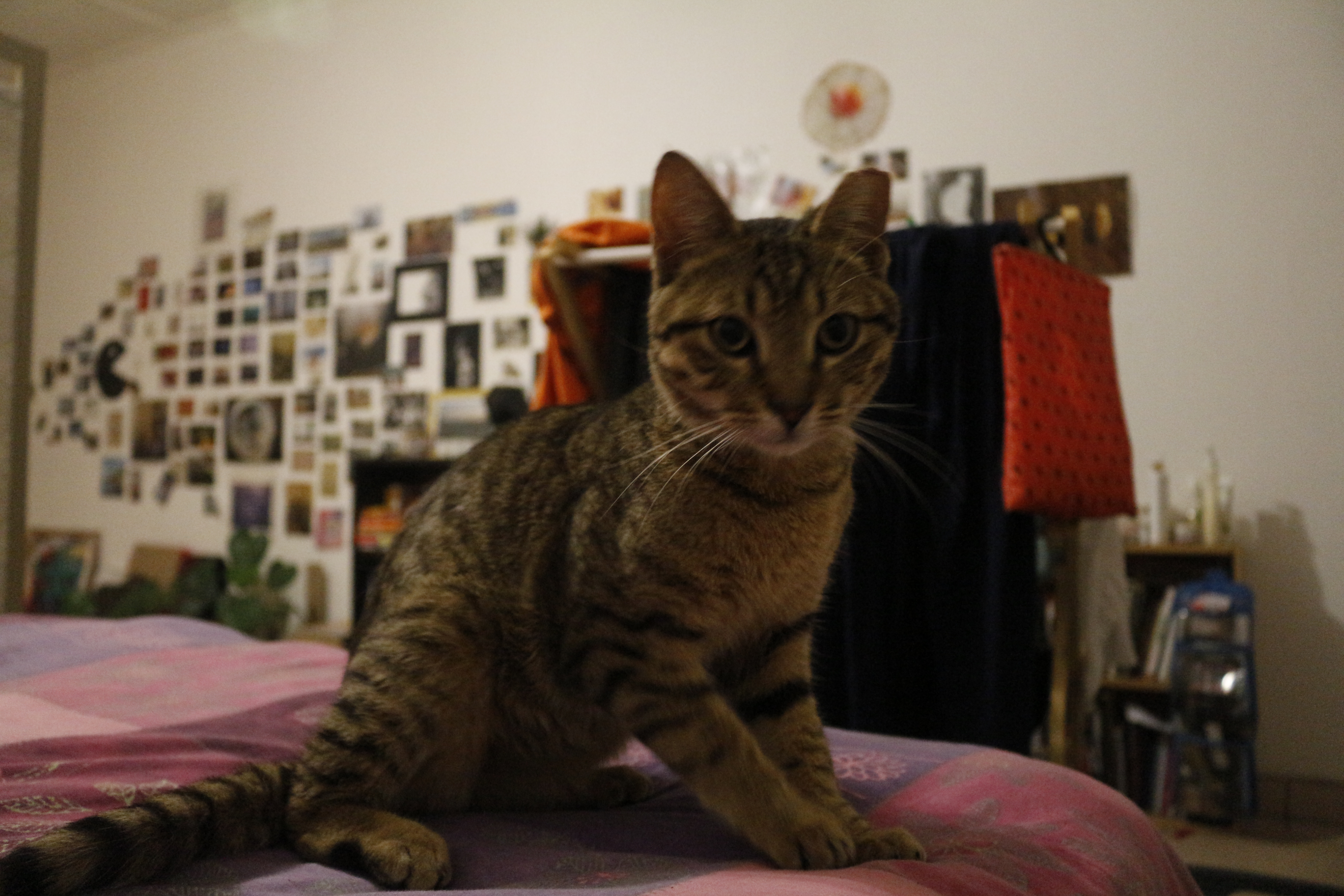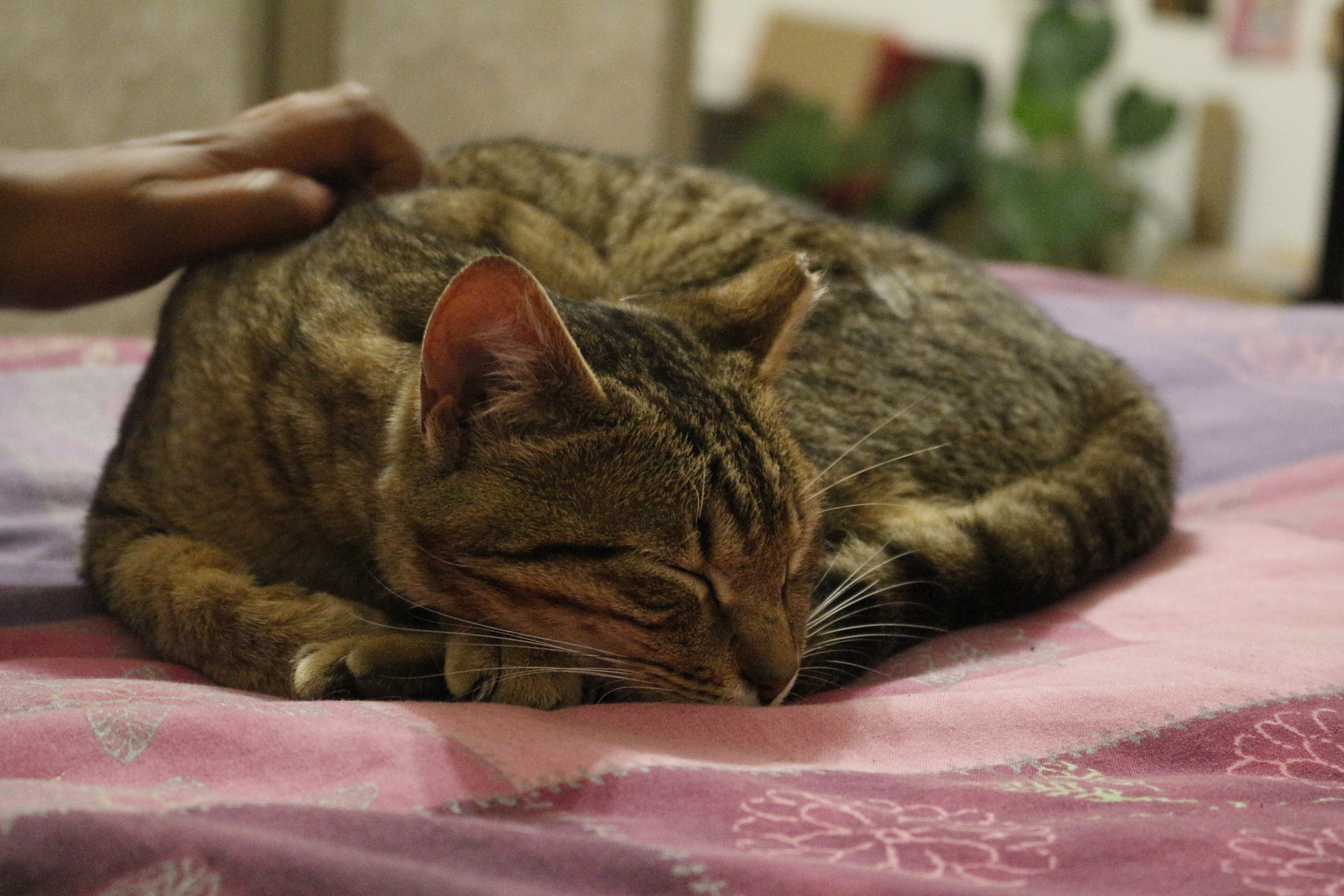A friend visited me in February, so I took a break from writing my thesis, made rooibos tea for us, and we settled in to catch up. The frantic, repetitive mewing of kittens outside my flat interrupted the afternoon. We couldn’t really enjoy our chat knowing there were small animals in need, so we went downstairs and, wedged between the fence and shared wall with the police station next door, sat three tiny furry things.
After trying to lead the animals to a broken part of the fence, and failing, we decided the only way to get them out was to head into the police station’s yard. My friend, my boyfriend, and I got a towel and went to the police station, and sheepishly asked the constable on duty if we could get the kittens out from their back wall. The constable looked very confused, and when someone came in to report something we ducked out the back, eager to leave before the police realised where we were. I was bangbroek when we got to the source of the commotion, so my friend grabbed the kittens, put them in the towel, and we ran back to my flat.
I wanted to reunite the kittens with their mom but she ran away into the building site diagonally opposite my flat, so I gave the still-screaming kittens to a woman in Melville who adopts rescue animals. A few weeks later, three more kittens appeared in the back garden of my block. My boyfriend and I named the two grey ones Scamps and Greyboy, and the brown one is Stripes—the family who live downstairs call Stripes Falafel.
From March to May I left a bakkie of food by a tree they slept under to win them over. I tried to get them used to humans but they would run away if I looked at them for a little too long. I would sit outside with a smoke under the tree and consider the future, wondering what to do before my last scholarship stipend ran out. The kittens developed their own personalities in this time: Stripes was rough and tough and climbed trees, Greyboy became adorably sleepy after eating, and Scamps preened when admired. The crew started hunting pigeons in winter when I felt too shit to leave my bed or flat. I hoped they were okay, but I wasn’t too great, and I conserved energy to feed myself.
In September came the big breakthrough: the caretakers of the block of flats got the kittens spayed. After the procedure, the kittens seemed less frightened of humans and hungry for loving touch. Stripes, the most adventurous of the crew, followed me around demanding food and attention. Initially, Greyboy and Scamps kept their distance, but once they saw their brother having fun, they joined in.

I once had a deep and persistent crush on a boy for two years, so the nine months it took for the cats to come around was nothing. The kittens, like a classmate crush, made me feel better through their distant presence and consistent cuteness. They were reliably there, didn’t ask for much, and made me appreciate moments of stillness and stability. They showed me I could nurture other living things.
My family has been mourning the loss of my grandfather, who passed away in October. Widowhood is not kind in Hinduism, and although South African versions of Hinduism allow for more freedom and independence than found in some places in in India, my grandmother’s generation still believe their life is over when their partner dies. They were together for 53 years, and I worry about aya’s health and what’s happening in her head. I call her all the time and I wonder about where she’ll live now that thatha is gone. She can’t leave Verulam for long periods of time until the one year prayer for thatha, so my aunts, my mom, and I are figuring things out.
Woke Gran, the counsellor I’ve been seeing since August, saves my world every Tuesday. I guess I’m more aware of my mortality these days. Thatha’s funeral rites shocked me into this realisation. I watched as someone my aya loves so much was brought into the house in an open casket, and then as he became ashes and was scattered into the ocean. All in less than 24 hours.
Beginnings and ends of years are largely institutional fictions, tied to time off work or school and year-end assessments from work or school. It might be that how we assess our years —what we accomplished, what we failed, how we loved, how we lost—fall into these institutional habits, but care persists, cutting across these fictions.
In a year when so much seemed to go wrong globally, when we learned that ecological catastrophe is much nearer than we had thought, it might seem frivolous to focus on kittens, on the care they taught me to give and the pleasure they gave, in turn. But caring for them reminded me that we share this planet with non-human kin, and that we care for this planet as we care for those kin. It might be that we cannot stop the catastrophic futures so many predict are inevitable, but for now, while we can, we can care.
Youlendree Appasamy






